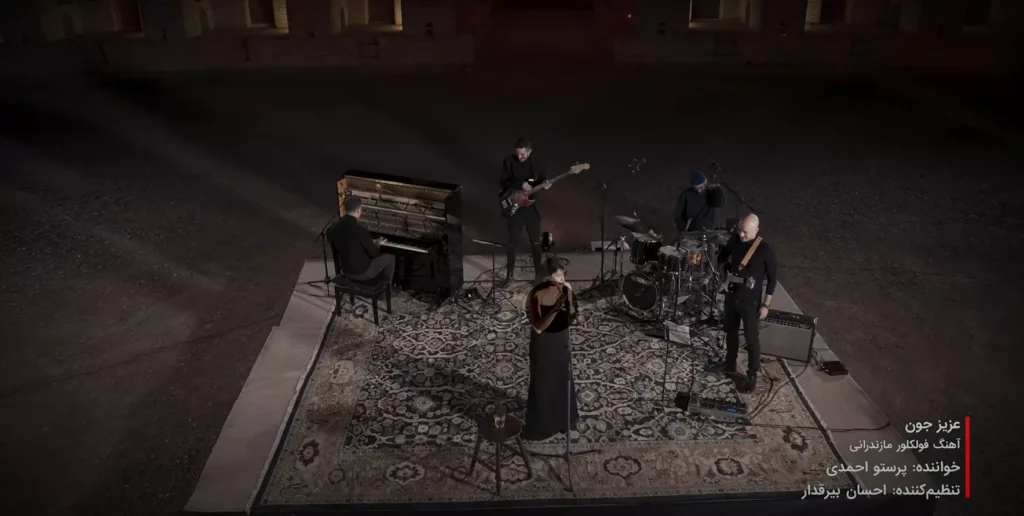Could a Female Singer’s Arrest Reignite Iran’s 2022 Protests?
WANA (Dec 16) – A 27-year-old singer hosted a virtual concert in “Deir-e Gachin” Caravansarai, situated in the Central District of Qom County, which lies 80 kilometers northeast of Qom, streamed on YouTube, where she sang without a hijab. Her performance, which contained themes of gender inequality and personal freedom, quickly went viral, getting over 1.4 million views.

While praised by her fans for its bravery, the concert also caught the attention of Iranian authorities, who arrested Ahmadi in her hometown of Sari just days later.
Who Is Parastoo Ahmadi?
Born and raised in northern Iran, Ahmadi first gained recognition in the underground music scene. Her lyrics often tackle sensitive topics, such as women’s rights and societal expectations, making her a controversial yet beloved figure among fans.
Ahmadi’s rise has not been easy. Female musicians in Iran face numerous restrictions, including bans on performing for mixed-gender audiences. Some singers comply to navigate the system, but Ahmadi refuses to compromise, which has made her a symbol of resistance and a target for criticism.
Why Was Her Concert So Controversial?
Ahmadi’s concert wasn’t just a performance; it was a statement. The setlist included songs highlighting women’s strength and the stifling pressures of societal conformity. But it wasn’t only her message that stirred controversy—it was the way she delivered it.
In Iran, strict Islamic laws require women to wear hijabs in all public appearances, even in virtual spaces. Moreover, mixed-gender performances are prohibited unless conducted under strict regulations.
By streaming her concert to a global audience without adhering to these rules, Ahmadi effectively challenged the cultural and legal status quo.
For many, her concert felt like a continuation of the protests following the death of Mahsa Amini in 2022- a young Iranian woman who died in custody for allegedly violating hijab laws.
In this context, Ahmadi’s performance was seen by supporters as a bold act of defiance and by critics as a dangerous provocation.
A Firestorm in Social Media
Ahmadi’s arrest ignited a heated debate online. Social media became a battleground where Iranians expressed their views on her actions—and the government’s response.
Supporters praised her as a symbol of courage. One Instagram user wrote, “Parastoo’s songs speak the truth we’re too afraid to say. She’s not just a singer; she’s a voice for all of us.” Others likened her to the many women who have risked their safety to stand up against restrictive laws.
Meanwhile, conservative critics argued that Ahmadi’s actions were reckless. “Freedom isn’t an excuse to break the rules. She knew the consequences,” a prominent religious commentator posted on Twitter.
Swift Arrest, Surprising Release
Ahmadi’s detention, while unsurprising given the context, was short-lived. Within 48 hours, she was released, raising questions about why her case didn’t follow the harsher penalties often seen in similar situations.
Analysts believe her swift release could have been a calculated move. Authorities may have wanted to avoid reigniting protests over women’s rights, particularly with international attention on the case.
Others speculate that her widespread popularity and the sheer volume of public outcry played a role in their decision to let her go.
For now, Ahmadi has remained silent about her trial, leaving fans and critics alike to speculate about her future. Will she continue to defy the rules? Or has the experience tempered her activism?
Who is Behind Efforts to Incite New Unrest in Iran?
According to information obtained by WANA News Agency, the controversial virtual concert featuring an underground female singer was recorded months ago but strategically released online after recent developments in Syria.
This timing has raised suspicions of deliberate intent to spark unrest in Iran.
Reports indicate that over one billion tomans (approximately $15,000) were spent on the concert’s production—a significant sum for any underground music band in Iran. Questions now arise about the financial backers behind this project and their motives.
The filming, editing, lighting, and choice of location were far beyond the capabilities of a typical underground music band in terms of concept and execution.
Iranian security officials have linked the case of Parastoo Ahmadi to an alleged attempt to reignite protests centered around women and hijab issues.
They claim this reflects a broader strategy by foreign elements, mainly Western nations, to replicate the unrest of 2022 in Iran.
Notably, following the brief detention of Ms. Ahmadi, Iranian celebrities and networks involved in the 2022 protests quickly mobilized, prompting speculation about their coordination. Critics argue that this campaign seeks to scratch Iran’s image with street protests, using the Syrian blueprint as a model.
The authorities refrained from immediately detaining the singer after her video went viral. Instead, they acted only after Islamic and pro-hijab groups raised objections, summoning the underground band for questioning before releasing them shortly thereafter.
This calculated response aimed to prevent opposition groups from exploiting the situation and avoid repeating the scenario of Mahsa Amini’s case.
Iran’s leadership appears alert to these tactics, attempting to defuse the situation before it spirals into more considerable unrest.












